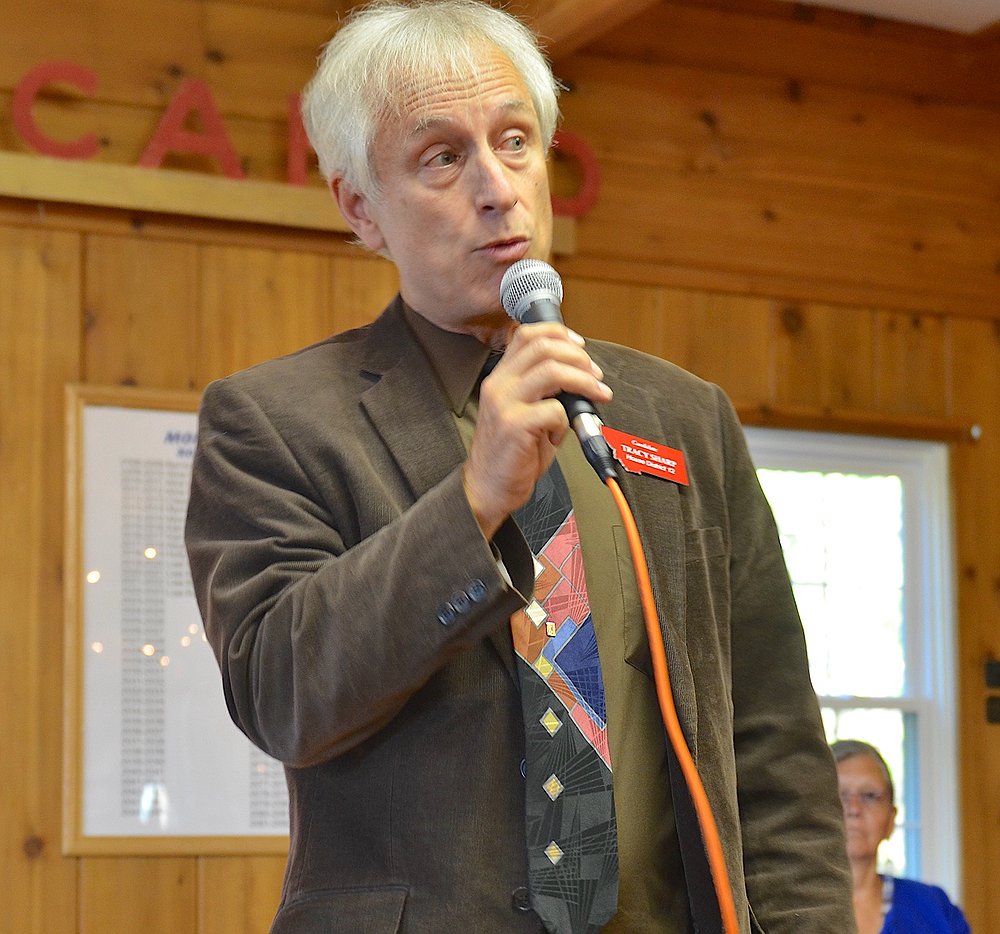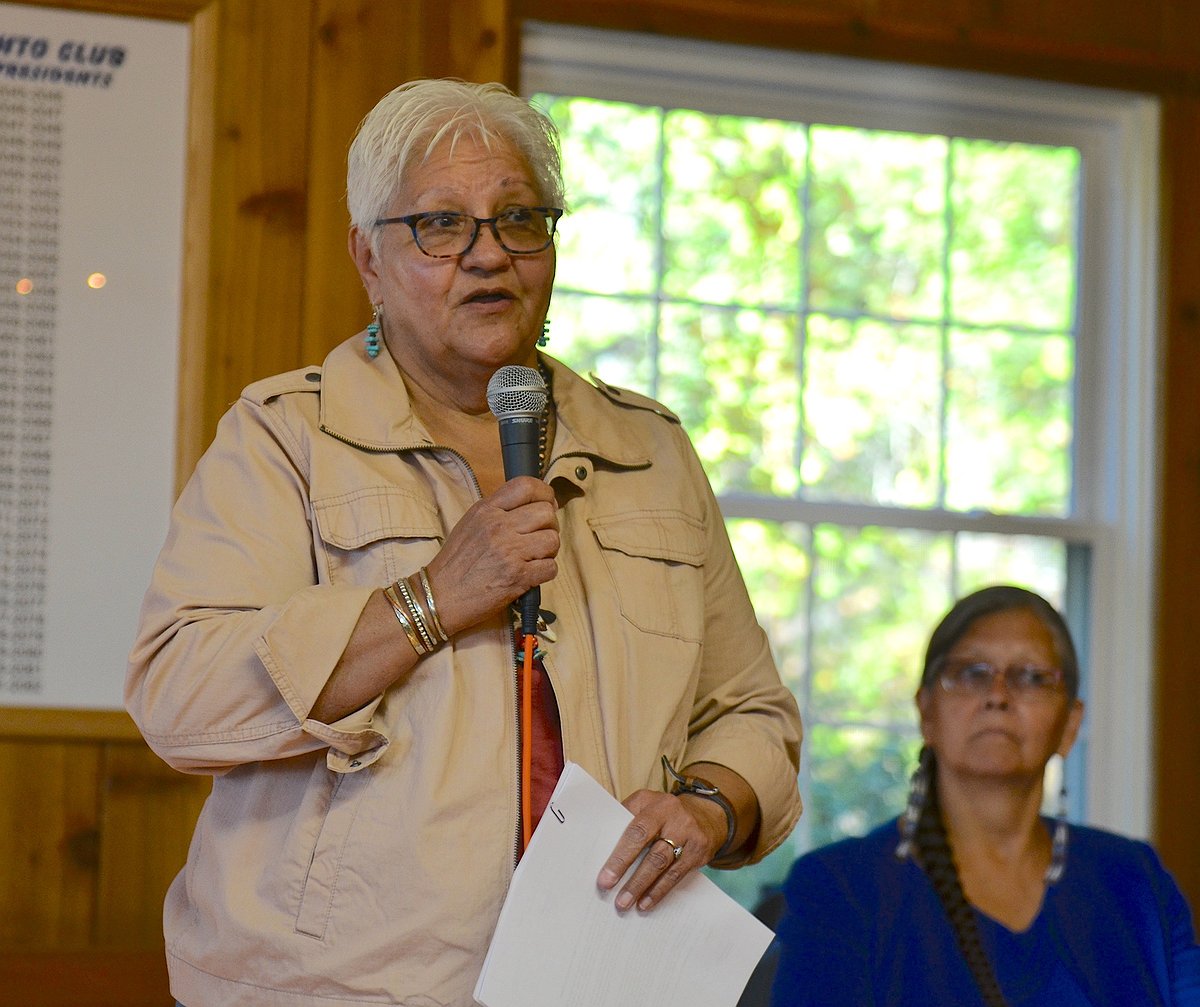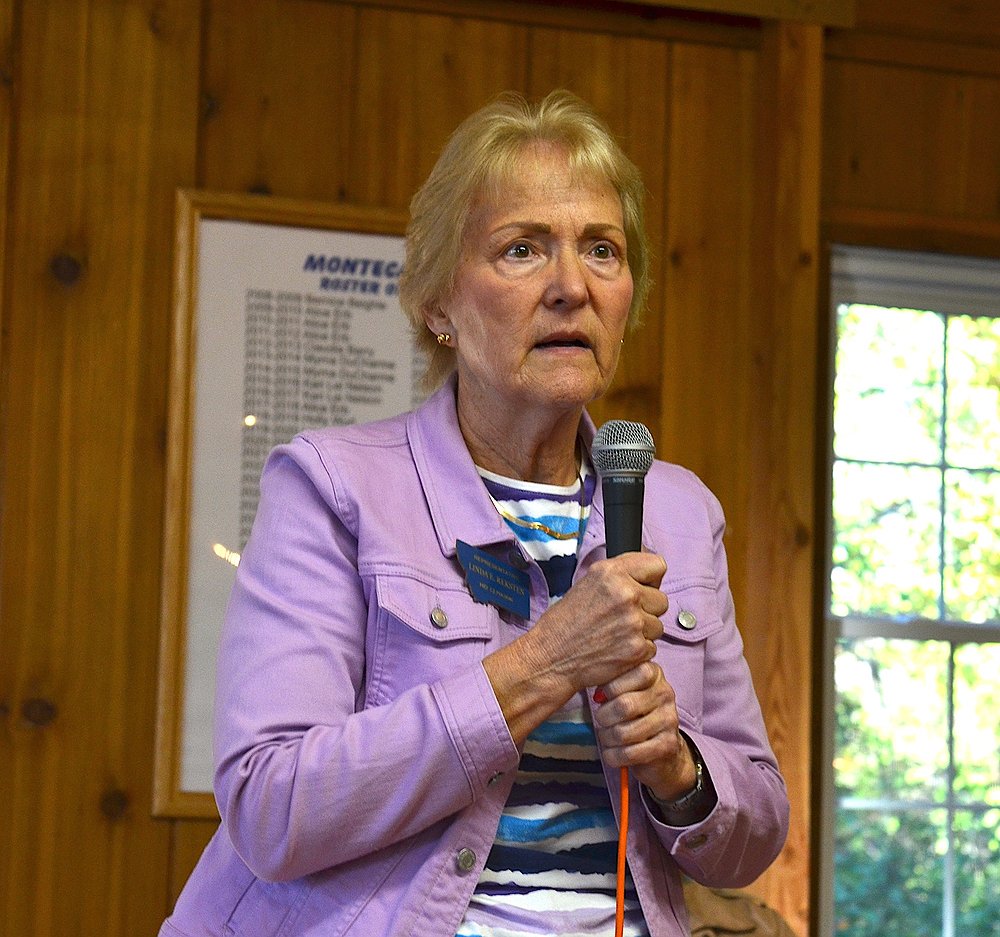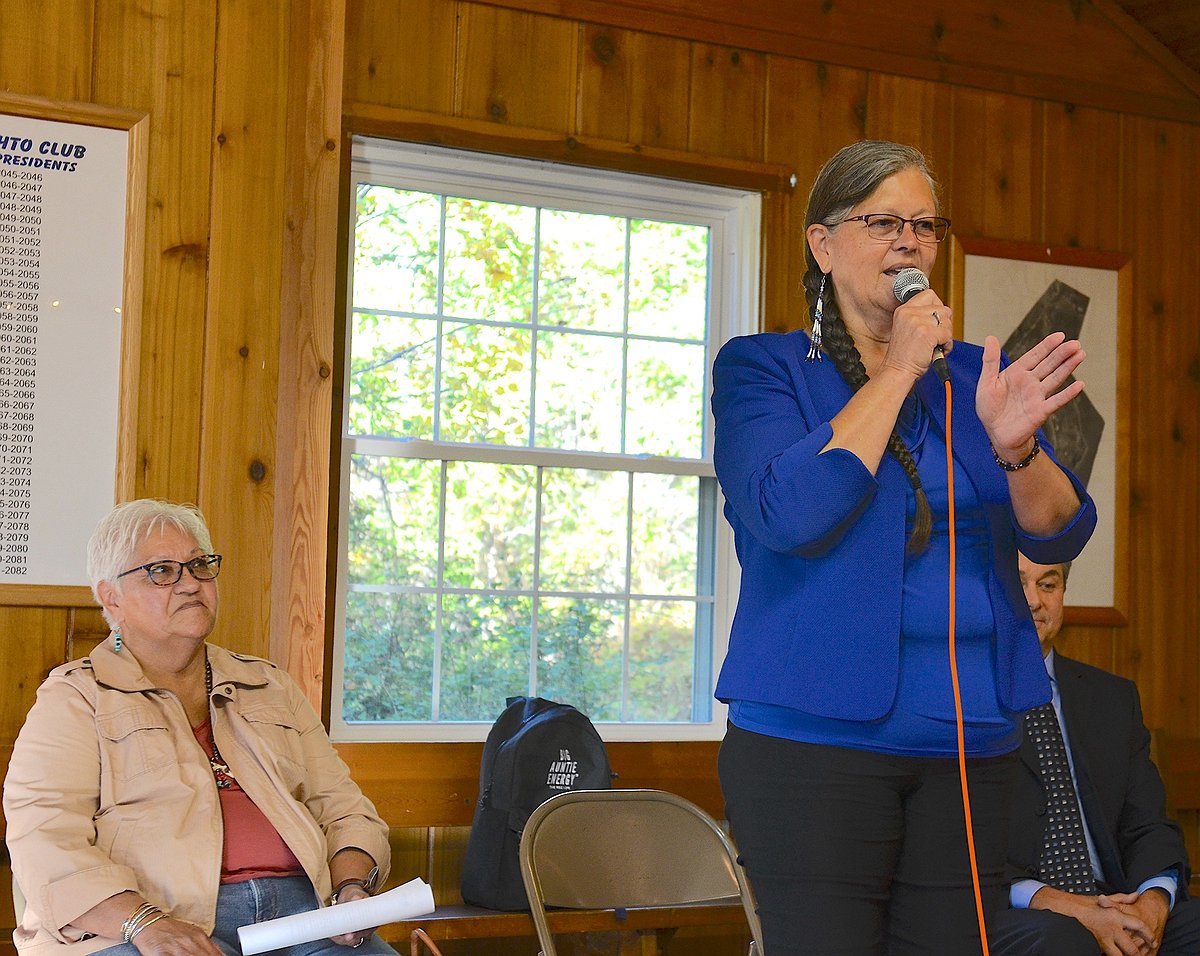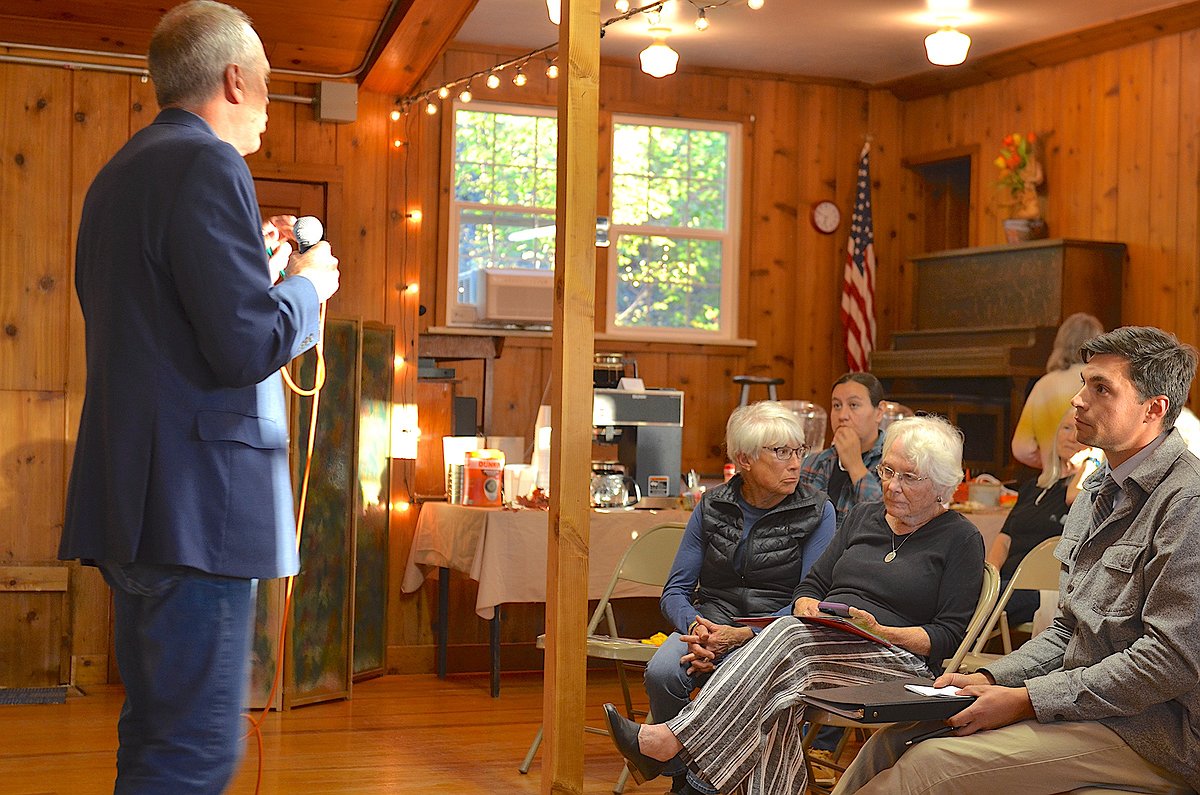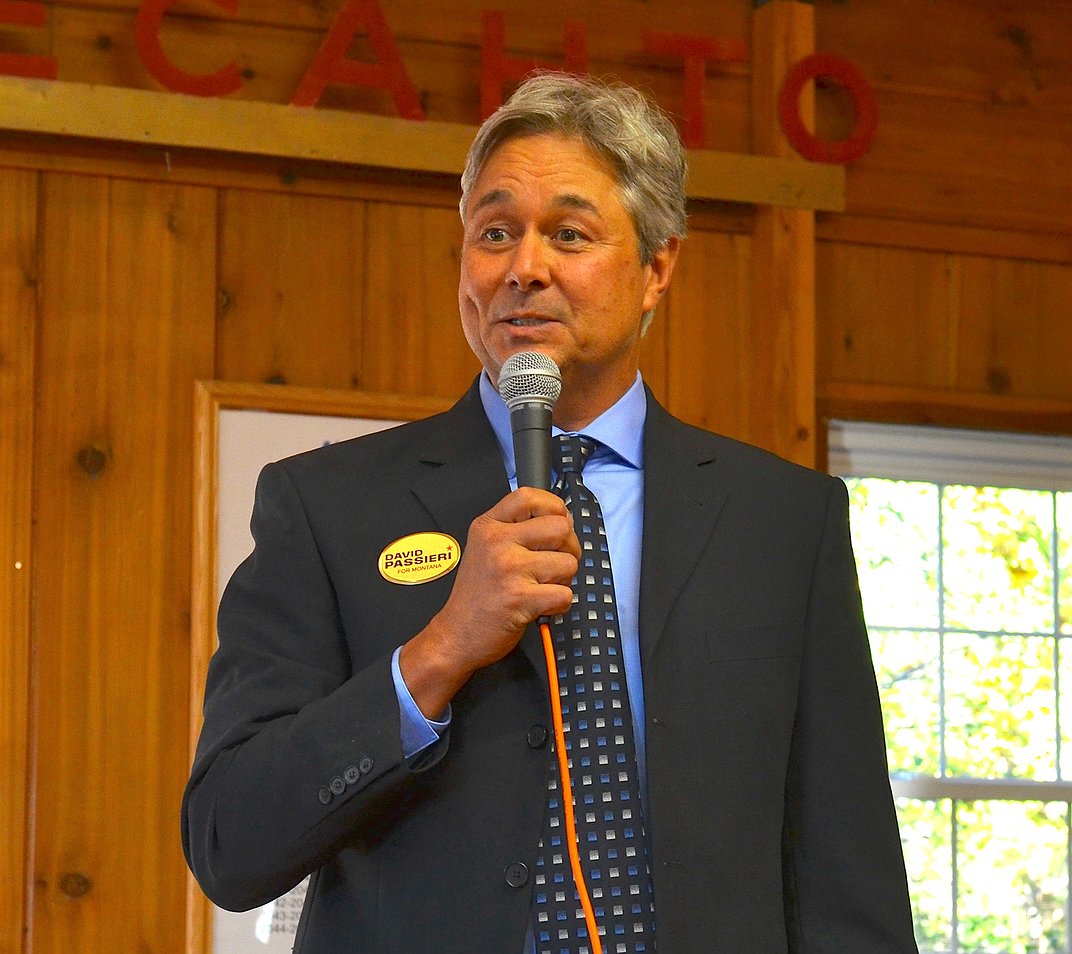Part I: Candidates from both parties converge at forum
Several candidates for Lake County’s legislative districts gave attendees a snapshot of their positions on everything from property taxes to abortion rights during a forum at Montecahto Club, north of Polson, last Thursday. Our first installment covers property taxes and Medicaid expansion. Part 2, which comes out Oct. 10, looks at stances on CI-128, regarding abortion access, affordable housing and education.
The event was co-sponsored by Lake County Democrats and Republicans and attracted close to 70 community members.
Moderator Thomas Spencer, who teaches government classes at Polson High, offered several prepared questions and two from the audience during the event, which lasted almost two hours.
Candidates included incumbent Sen. Greg Hertz, who is running for a second senate term in the newly drawn Senate District 7, which extends into Sanders County; his opponent is Democrat Craig Pablo, who did not attend the forum. Hertz, a CPA who owns six grocery stores, has served in both the House and Senate since 2012, and describes himself as “a tax guy.”
“I've been in business for 30-plus years, so that's really helped me navigate this legislature and work with the executive branch and just understand what's going on out there with people, with businesses, and everything else,” he said.
Incumbent Rep. Linda Reksten of Polson faces Democrat Shirley Azzopardi, who lives southwest of town, in the race for House District 13; both candidates were present, and both have extensive backgrounds in education.
Reksten was born and raised in Polson, as were her mother and grandparents. She spent 34 years as an educator out of state, before returning to Montana where she served as superintendent of schools in Butte and Polson before retiring.
This would mark her third term in the House of Representatives, where she served in 2023 as vice chair of the Education Committee.
“I was able to pass four bills that are signed into law, mostly on the education side, and I'm really proud of that,” she said.
Azzopardi taught special education for 30 years, most of those in St. Ignatius, and is now the mental health care coordinator for Early Childhood Services in the tribal Head Start program.
If elected, Azzopardi lists her priorities as reducing property taxes, keeping public schools strong and maintaining reproductive freedoms. “The reason I'm running is I want to see our state government be responsive to the needs of Montanans,” she said.
Tracy Sharp, chair of the local Republican Party, filed for HD 12; his opponent, Democrat Barry Olson of Bigfork, wasn’t present Thursday. Sharp grew up in Hot Springs and had a lengthy military career before retiring in Polson.
Through his involvement in local party politics, he discovered “that there aren't masterminds out there running the state. It's us.”
“And that's why I'm here. I'm running for House District 12 because I believe all of us collectively together are the best representation for what we see as important here in this valley,” he said.
Political newcomer and Democrat Thedis Crowe of the Blackfeet Reservation seeks to represent HD 15, which straddles the Continental Divide from Browning and Heart Butte to St. Ignatius; her opponent, Republican Ralph Foster of Mission, did not attend the forum.
Crowe, who lives on a ranch near Heart Butte, spent 33 years working for the federal government. With degrees in natural resources, Native American studies and management and public administration, “I have a very unique set of skills I can bring to the table.”
Democrat Shelly Fyant of Arlee and Republican David Passieri of St. Ignatius are seeking to represent HD 91, a new district that extends from the south side of Round Butte Road in Ronan to Arlee and the Missoula’s upper Rattlesnake area.
Fyant served on the Arlee School Board before being elected to two four-year terms on the Confederated Salish and Kootenai Tribal Council. She was elected chair in 2020, just a few months before COVID struck.
She successfully reached out to the three Republican county commissioners, as well as healthcare officials, “to develop a unified incident command team to protect the health and safety of all the people of the Flathead Reservation,” she said, emphasizing her ability to work across the aisle. “So, I'm pretty sure I can handle whatever Helena has to dish out.”
Passieri is a real estate broker who moved to Montana 20 years ago.
“I came here specifically to be on the Indian reservation. I felt it would be a great way to be with a people that were sort of sovereign from federal encroachment,” he said.
He’s served on the Lake County Board of Adjustments and currently sits on the county planning board. He said he’s testified before the Legislature since 2013 on numerous issues, including voicing opposition to the CSKT water compact.
Two other candidates, Republican Charles Headley of Arlee and Democrat Jacinda Morigeau of Arlee, are each vying to represent SD 46; neither attended, although each sent opening statements. The new senate district encompasses a big chunk of the Flathead Reservation, as well as the Rattlesnake area and East Missoula.
What property tax reform policies do you support for Montana?
Hertz, who serves on Gov. Greg Gianforte’s property tax task force, favors passing a homestead exemption that would provide full-time Montana residents (those who live here at least seven months annually) with a 15-20% tax break.
“But for every dollar that I decrease your taxes, somebody else's taxes are going to go up,” he said. Those who own short-term rentals or second homes would be apt to see an increase in their taxes to fund the exemption.
While Sharp (and all other candidates) supported the homestead exemption, he called property taxes “the most immoral tax of all.”
“It's a tax on unrealized gains and it's a way that only people who are already through their most productive years can lose their houses,” he said. He also called for larger participation in the passage of local levies, which also lead to tax increases.
Reksten blamed high property taxes, in part, on the federal deficit. She’s against increasing taxes on small businesses “which is all we have in Lake County,” and instead supports upping taxes on “people that are not here seven months and that are building big homes on the lake.”
Azzopardi said high property taxes “come up at almost every single door I knock on,” and chastised Republican legislators for not following a recommendation made by the Department of Revenue in 2022 to reduce the taxable value rate from 1.35% to 0.94%.
“Republicans have a super majority, and there is no excuse for not getting it done,” she said. “As a result, we now have higher property taxes, and that is a burden on people.”
In addition to the homestead exemption, she suggested expanding the elderly homeowners tax credit, adjusting the residential tax rates, increasing the property tax assistance program and examining current property tax exemptions.
Crowe said Republicans purported to support cutting income taxes and property taxes for Montana's families as key pillars of their budget.
“So we definitely need to look at why do we have a budget surplus and look at why our property taxes are increasing,” she said.
Fyant supports a housing fairness credit, coupled with the homestead exemption, and asking “the wealthy to pay their fair share.”
She was also puzzled by higher property taxes, especially in light of a $2 billion budget surplus. “This has been going on for three decades, cutting taxes for the wealthy and creating loopholes for special interests and out-of-state corporations,” she said
Hertz countered that the Legislature approved “up to $3,800 per family for income tax and property tax rebates” – moves he said were only supported by two Democrats in the 50-member Senate.
Passieri suggested expanding bed-tax options to capture revenue from Montana’s sizeable influx of tourists, a phenomenon he called “a double-edged sword.” In addition to the homestead exemption, he mentioned a “comstead exemption” for small commercial businesses.
How important is Medicaid expansion to Montana?
The panel all appeared to support the expansion of Medicaid, which will require approval from both the legislature and governor in 2025.
Fyant enumerated the program’s economic and healthcare benefits. “Medicaid keeps our rural hospitals open,” she said. “Ninety-six percent of Medicaid enrollees are working, they're caretakers, they're in school, or they have an illness or disability.”
She also told the audience that Medicaid results in $775 million worth of economic activity across Montana, and covers 13,000 residents of House District 91, who live in Lake, Sanders and Missoula counties.
Republicans mostly favored adding a work requirement, although the federal government – which funds around 90% of Medicaid – has rejected that demand in the past.
“It's important for the indigent people, the people who have mental health problems, and the poor,” Hertz said. “But right now we have people who are on Medicaid expansion who don't belong in there.”
Sharp was concerned that people with mental illness are winding up jail, when Medicaid-financed treatment could be a more effective option. “There are ways that Medicaid expansion can help our state, and we should be deeply researching how that's done and clear the rolls of people that don't really need it,” he said.
Reksten said the administrator at St. Luke Hospital told her the Ronan facility could lose up to $5 million annually if the expansion is denied. She described the expansion as “a real hot-button issue” for the upcoming session.
“We need to make sure that we provide for those people that really do need Medicaid and not get held high and dry by the federal government” if it reduces funding for the program.
Passieri said he would support expansion only if there was another sunset provision. “I would sure hate to see our state get hamstrung with a great deal of expense that's going to end up being the taxpayer's problem,” he said.
He suggested that the state could be creating “a new tourism here” for people “chasing these kind of Medicaid expansion programs.”
Azzopardi voiced her support for expansion, but said it should not be paired with a work requirement. “We have a working poor in the state and in Lake County. Working for the Head Start program, I see the families every day,” she said. “And they are working, and health care and health insurance is a huge expense.”
She also favored making the state’s participation in the expanded program permanent.
Crowe said the existing program for reenrolling Medicaid recipients “is definitely broken” and has impacted “low-income populations, people that are out in the rural areas, nursing home residents, people that are in long-term care facilities, and people that are in hospice.”
She favors reupping Medicare expansion and simplifying enrollment.








